Jiajun Sun
ChartE$^{3}$: A Comprehensive Benchmark for End-to-End Chart Editing
Jan 29, 2026Abstract:Charts are a fundamental visualization format for structured data analysis. Enabling end-to-end chart editing according to user intent is of great practical value, yet remains challenging due to the need for both fine-grained control and global structural consistency. Most existing approaches adopt pipeline-based designs, where natural language or code serves as an intermediate representation, limiting their ability to faithfully execute complex edits. We introduce ChartE$^{3}$, an End-to-End Chart Editing benchmark that directly evaluates models without relying on intermediate natural language programs or code-level supervision. ChartE$^{3}$ focuses on two complementary editing dimensions: local editing, which involves fine-grained appearance changes such as font or color adjustments, and global editing, which requires holistic, data-centric transformations including data filtering and trend line addition. ChartE$^{3}$ contains over 1,200 high-quality samples constructed via a well-designed data pipeline with human curation. Each sample is provided as a triplet of a chart image, its underlying code, and a multimodal editing instruction, enabling evaluation from both objective and subjective perspectives. Extensive benchmarking of state-of-the-art multimodal large language models reveals substantial performance gaps, particularly on global editing tasks, highlighting critical limitations in current end-to-end chart editing capabilities.
Multimodal Signal Processing For Thermo-Visible-Lidar Fusion In Real-time 3D Semantic Mapping
Jan 14, 2026Abstract:In complex environments, autonomous robot navigation and environmental perception pose higher requirements for SLAM technology. This paper presents a novel method for semantically enhancing 3D point cloud maps with thermal information. By first performing pixel-level fusion of visible and infrared images, the system projects real-time LiDAR point clouds onto this fused image stream. It then segments heat source features in the thermal channel to instantly identify high temperature targets and applies this temperature information as a semantic layer on the final 3D map. This approach generates maps that not only have accurate geometry but also possess a critical semantic understanding of the environment, making it highly valuable for specific applications like rapid disaster assessment and industrial preventive maintenance.
Muse: Towards Reproducible Long-Form Song Generation with Fine-Grained Style Control
Jan 08, 2026Abstract:Recent commercial systems such as Suno demonstrate strong capabilities in long-form song generation, while academic research remains largely non-reproducible due to the lack of publicly available training data, hindering fair comparison and progress. To this end, we release a fully open-source system for long-form song generation with fine-grained style conditioning, including a licensed synthetic dataset, training and evaluation pipelines, and Muse, an easy-to-deploy song generation model. The dataset consists of 116k fully licensed synthetic songs with automatically generated lyrics and style descriptions paired with audio synthesized by SunoV5. We train Muse via single-stage supervised finetuning of a Qwen-based language model extended with discrete audio tokens using MuCodec, without task-specific losses, auxiliary objectives, or additional architectural components. Our evaluations find that although Muse is trained with a modest data scale and model size, it achieves competitive performance on phoneme error rate, text--music style similarity, and audio aesthetic quality, while enabling controllable segment-level generation across different musical structures. All data, model weights, and training and evaluation pipelines will be publicly released, paving the way for continued progress in controllable long-form song generation research. The project repository is available at https://github.com/yuhui1038/Muse.
From Scores to Preferences: Redefining MOS Benchmarking for Speech Quality Reward Modeling
Oct 01, 2025Abstract:Assessing the perceptual quality of synthetic speech is crucial for guiding the development and refinement of speech generation models. However, it has traditionally relied on human subjective ratings such as the Mean Opinion Score (MOS), which depend on manual annotations and often suffer from inconsistent rating standards and poor reproducibility. To address these limitations, we introduce MOS-RMBench, a unified benchmark that reformulates diverse MOS datasets into a preference-comparison setting, enabling rigorous evaluation across different datasets. Building on MOS-RMBench, we systematically construct and evaluate three paradigms for reward modeling: scalar reward models, semi-scalar reward models, and generative reward models (GRMs). Our experiments reveal three key findings: (1) scalar models achieve the strongest overall performance, consistently exceeding 74% accuracy; (2) most models perform considerably worse on synthetic speech than on human speech; and (3) all models struggle on pairs with very small MOS differences. To improve performance on these challenging pairs, we propose a MOS-aware GRM that incorporates an MOS-difference-based reward function, enabling the model to adaptively scale rewards according to the difficulty of each sample pair. Experimental results show that the MOS-aware GRM significantly improves fine-grained quality discrimination and narrows the gap with scalar models on the most challenging cases. We hope this work will establish both a benchmark and a methodological framework to foster more rigorous and scalable research in automatic speech quality assessment.
MDAR: A Multi-scene Dynamic Audio Reasoning Benchmark
Sep 26, 2025Abstract:The ability to reason from audio, including speech, paralinguistic cues, environmental sounds, and music, is essential for AI agents to interact effectively in real-world scenarios. Existing benchmarks mainly focus on static or single-scene settings and do not fully capture scenarios where multiple speakers, unfolding events, and heterogeneous audio sources interact. To address these challenges, we introduce MDAR, a benchmark for evaluating models on complex, multi-scene, and dynamically evolving audio reasoning tasks. MDAR comprises 3,000 carefully curated question-answer pairs linked to diverse audio clips, covering five categories of complex reasoning and spanning three question types. We benchmark 26 state-of-the-art audio language models on MDAR and observe that they exhibit limitations in complex reasoning tasks. On single-choice questions, Qwen2.5-Omni (open-source) achieves 76.67% accuracy, whereas GPT-4o Audio (closed-source) reaches 68.47%; however, GPT-4o Audio substantially outperforms Qwen2.5-Omni on the more challenging multiple-choice and open-ended tasks. Across all three question types, no model achieves 80% performance. These findings underscore the unique challenges posed by MDAR and its value as a benchmark for advancing audio reasoning research.Code and benchmark can be found at https://github.com/luckyerr/MDAR.
Controllable Skin Synthesis via Lesion-Focused Vector Autoregression Model
Aug 27, 2025Abstract:Skin images from real-world clinical practice are often limited, resulting in a shortage of training data for deep-learning models. While many studies have explored skin image synthesis, existing methods often generate low-quality images and lack control over the lesion's location and type. To address these limitations, we present LF-VAR, a model leveraging quantified lesion measurement scores and lesion type labels to guide the clinically relevant and controllable synthesis of skin images. It enables controlled skin synthesis with specific lesion characteristics based on language prompts. We train a multiscale lesion-focused Vector Quantised Variational Auto-Encoder (VQVAE) to encode images into discrete latent representations for structured tokenization. Then, a Visual AutoRegressive (VAR) Transformer trained on tokenized representations facilitates image synthesis. Lesion measurement from the lesion region and types as conditional embeddings are integrated to enhance synthesis fidelity. Our method achieves the best overall FID score (average 0.74) among seven lesion types, improving upon the previous state-of-the-art (SOTA) by 6.3%. The study highlights our controllable skin synthesis model's effectiveness in generating high-fidelity, clinically relevant synthetic skin images. Our framework code is available at https://github.com/echosun1996/LF-VAR.
Speech-Language Models with Decoupled Tokenizers and Multi-Token Prediction
Jun 14, 2025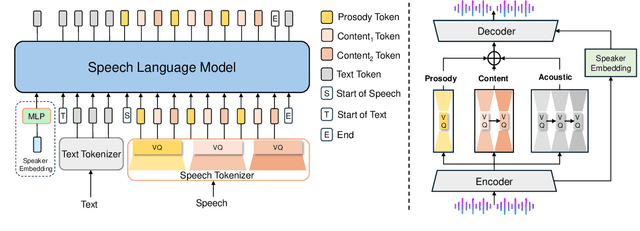
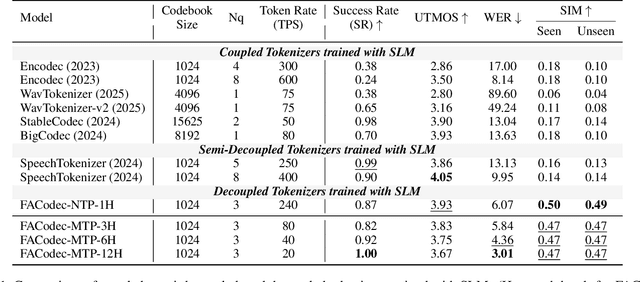
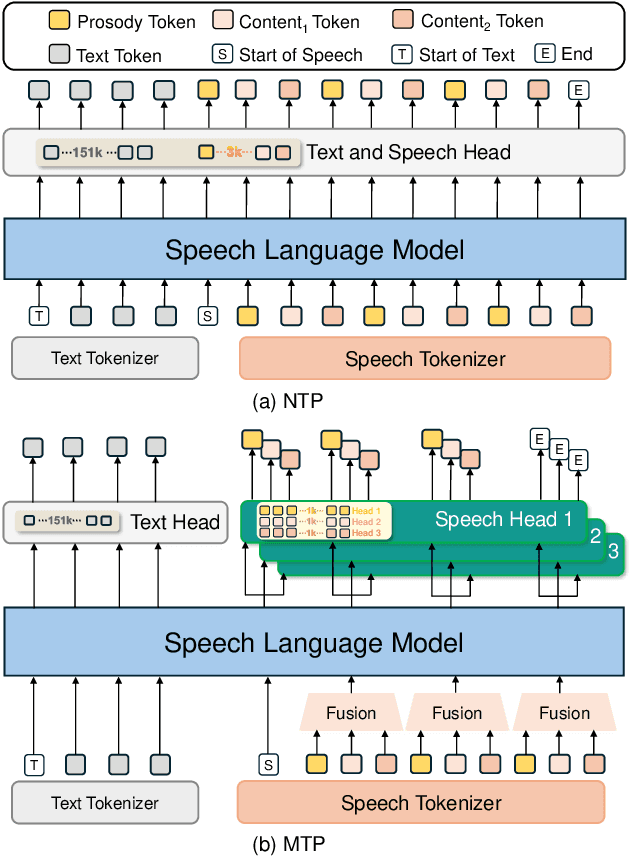
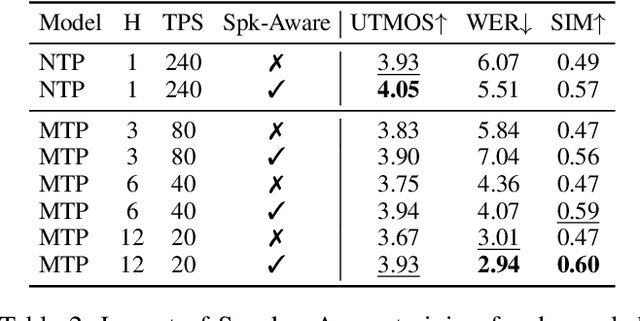
Abstract:Speech-language models (SLMs) offer a promising path toward unifying speech and text understanding and generation. However, challenges remain in achieving effective cross-modal alignment and high-quality speech generation. In this work, we systematically investigate the impact of key components (i.e., speech tokenizers, speech heads, and speaker modeling) on the performance of LLM-centric SLMs. We compare coupled, semi-decoupled, and fully decoupled speech tokenizers under a fair SLM framework and find that decoupled tokenization significantly improves alignment and synthesis quality. To address the information density mismatch between speech and text, we introduce multi-token prediction (MTP) into SLMs, enabling each hidden state to decode multiple speech tokens. This leads to up to 12$\times$ faster decoding and a substantial drop in word error rate (from 6.07 to 3.01). Furthermore, we propose a speaker-aware generation paradigm and introduce RoleTriviaQA, a large-scale role-playing knowledge QA benchmark with diverse speaker identities. Experiments demonstrate that our methods enhance both knowledge understanding and speaker consistency.
Mitigating Object Hallucinations in MLLMs via Multi-Frequency Perturbations
Mar 19, 2025Abstract:Recently, multimodal large language models (MLLMs) have demonstrated remarkable performance in visual-language tasks. However, the authenticity of the responses generated by MLLMs is often compromised by object hallucinations. We identify that a key cause of these hallucinations is the model's over-susceptibility to specific image frequency features in detecting objects. In this paper, we introduce Multi-Frequency Perturbations (MFP), a simple, cost-effective, and pluggable method that leverages both low-frequency and high-frequency features of images to perturb visual feature representations and explicitly suppress redundant frequency-domain features during inference, thereby mitigating hallucinations. Experimental results demonstrate that our method significantly mitigates object hallucinations across various model architectures. Furthermore, as a training-time method, MFP can be combined with inference-time methods to achieve state-of-the-art performance on the CHAIR benchmark.
Evaluating the Generalizability of LLMs in Automated Program Repair
Mar 12, 2025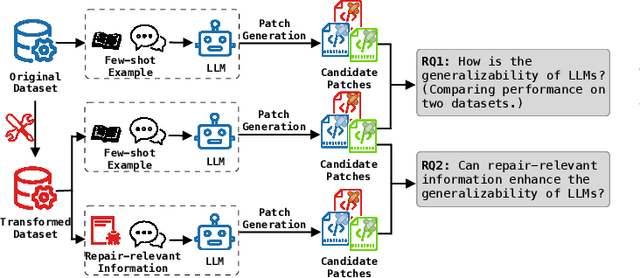
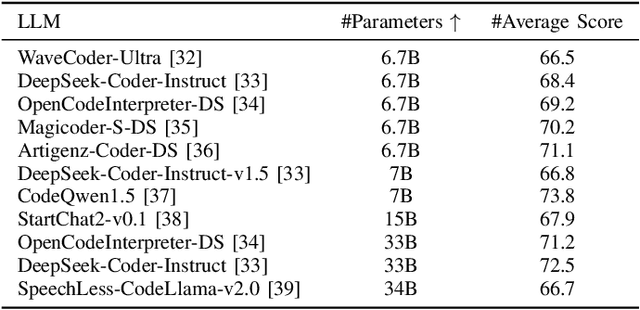
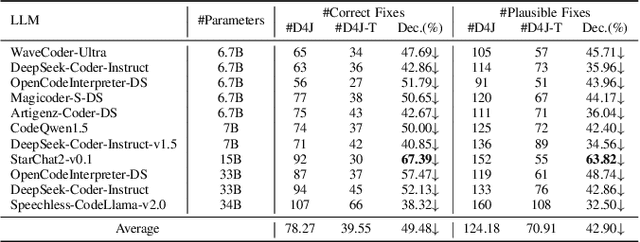

Abstract:LLM-based automated program repair methods have attracted significant attention for their state-of-the-art performance. However, they were primarily evaluated on a few well known datasets like Defects4J, raising questions about their effectiveness on new datasets. In this study, we evaluate 11 top-performing LLMs on DEFECTS4J-TRANS, a new dataset derived from transforming Defects4J while maintaining the original semantics. Results from experiments on both Defects4J and DEFECTS4J-TRANS show that all studied LLMs have limited generalizability in APR tasks, with the average number of correct and plausible patches decreasing by 49.48% and 42.90%, respectively, on DEFECTS4J-TRANS. Further investigation into incorporating additional repair-relevant information in repair prompts reveals that, although this information significantly enhances the LLMs' capabilities (increasing the number of correct and plausible patches by up to 136.67% and 121.82%, respectively), performance still falls short of their original results. This indicates that prompt engineering alone is insufficient to substantially enhance LLMs' repair capabilities. Based on our study, we also offer several recommendations for future research.
Predicting Large Language Model Capabilities on Closed-Book QA Tasks Using Only Information Available Prior to Training
Feb 06, 2025Abstract:The GPT-4 technical report from OpenAI suggests that model performance on specific tasks can be predicted prior to training, though methodologies remain unspecified. This approach is crucial for optimizing resource allocation and ensuring data alignment with target tasks. To achieve this vision, we focus on predicting performance on Closed-book Question Answering (CBQA) tasks, which are closely tied to pre-training data and knowledge retention. We address three major challenges: 1) mastering the entire pre-training process, especially data construction; 2) evaluating a model's knowledge retention; and 3) predicting task-specific knowledge retention using only information available prior to training. To tackle these challenges, we pre-train three large language models (i.e., 1.6B, 7B, and 13B) using 560k dollars and 520k GPU hours. We analyze the pre-training data with knowledge triples and assess knowledge retention using established methods. Additionally, we introduce the SMI metric, an information-theoretic measure that quantifies the relationship between pre-training data, model size, and task-specific knowledge retention. Our experiments reveal a strong linear correlation ($\text{R}^2 > 0.84$) between the SMI metric and the model's accuracy on CBQA tasks across models of varying sizes (i.e., 1.1B, 1.6B, 7B, and 13B). The dataset, model, and code are available at https://github.com/yuhui1038/SMI.
 Add to Chrome
Add to Chrome Add to Firefox
Add to Firefox Add to Edge
Add to Edge